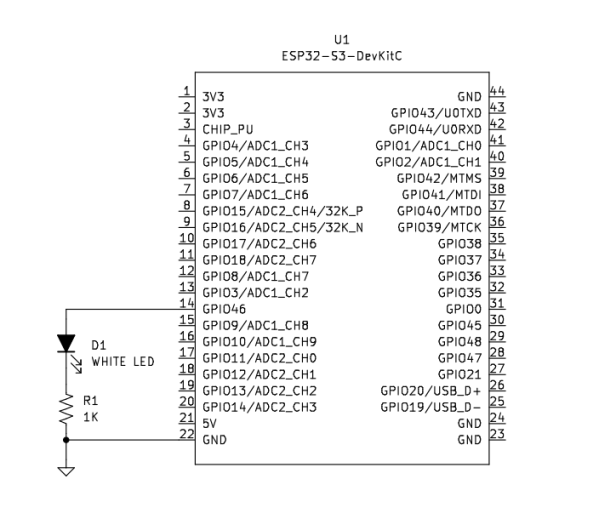
I’ve been cleaning up some code, and I decided to go back and do a smidge of refactoring of the original post. So here’s the new code. Comments on what changed and why follows.
#include <stdio.h>#include "freertos/FreeRTOS.h"#include "freertos/task.h"#include "driver/gpio.h"#include "esp_log.h"#include "led_strip.h"#include "sdkconfig.h"#include <vector>#include <tuple>typedef std::tuple<int, int, int, int> led_color;const std::vector <led_color> colors {{0,32,0,0}, // red{0,0,32,0}, // green{0,0,0,32}, // blue{0,0,32,32}, // cyan{0,32,0,32}, // magenta{0,32,16,0}, // yellow{0,0,0,0}// black};// Task 1.//static void task_blink_neo_pixel(void * pvParameters) {static led_strip_t *pStrip_a;pStrip_a = led_strip_init(CONFIG_BLINK_LED_RMT_CHANNEL, CONFIG_BLINK_GPIO, 1);pStrip_a->clear(pStrip_a, 50);// Stay in an endless loop. Don't return from this task.//while(true) {for(led_color c : colors) {pStrip_a->set_pixel(pStrip_a,std::get<0>(c), std::get<1>(c), std::get<2>(c), std::get<3>(c));pStrip_a->refresh(pStrip_a, 100);vTaskDelay(500 / portTICK_PERIOD_MS);// Set NeoPixel LED dark by clearing all its individual LEDs.pStrip_a->clear(pStrip_a, 50);vTaskDelay(500 / portTICK_PERIOD_MS);}}}// Task 2.//static void task_blink_led(void * pvParameters) {gpio_reset_pin(GPIO_NUM_46);// Set the GPIO as a push/pull output//gpio_set_direction(GPIO_NUM_46, GPIO_MODE_OUTPUT);// Stay in an endless loop. Don't return from this task.//while (true) {gpio_set_level(GPIO_NUM_46, true); // LED onvTaskDelay(100 / portTICK_PERIOD_MS);gpio_set_level(GPIO_NUM_46, false); // LED offvTaskDelay(100 / portTICK_PERIOD_MS);gpio_set_level(GPIO_NUM_46, true); // LED onvTaskDelay(100 / portTICK_PERIOD_MS);gpio_set_level(GPIO_NUM_46, false); // LED offvTaskDelay(2700 / portTICK_PERIOD_MS);}}extern "C" void app_main(void) {static const char *TAG = "DUAL_BLINK";int core = xPortGetCoreID();ESP_LOGI(TAG, "app_main running on core %i", core);ESP_LOGI(TAG, "CONFIG_BLINK_GPIO %i", CONFIG_BLINK_GPIO);// Create task 1.//TaskHandle_t xHandle1 = NULL;static uint8_t ucParameterToPass1 = 1;xTaskCreate(task_blink_neo_pixel,"BlinkNeoPixel",// human readable task name.2048, // stack size in bytes.&ucParameterToPass1,tskIDLE_PRIORITY,&xHandle1);configASSERT(xHandle1);// Create task 2.//TaskHandle_t xHandle2 = NULL;static uint8_t ucParameterToPass2 = 1;xTaskCreate(task_blink_led,"BlinkLED", // human-readable task name.2048, // stack size in bytes.&ucParameterToPass2,tskIDLE_PRIORITY,&xHandle2);configASSERT(xHandle2);// Stay in an endless loop. Don't return from this task.//while (true) {vTaskDelay(1000 / portTICK_PERIOD_MS);}}Here’s what changed.
- ESP-IDF was updated to version 4.4.3. I’m using that now, waiting in anticipation of the version 5.0.0 drop. Version 5 is now a release candidate, but I’m holding off stepping up to that until there’s a full formal release.
- The source file was renamed to dualblink.cpp. That cpp extension signals to the tool chain to treat this as a C++ source file, with all that implies. This allowed me to include vector and tuple (lines 18 and 19), which then provided me with a better way to define the collection of colors to cycle through in the task_blink_neo_pixel task. This eliminates having to explicitly define a size of the data structure.
- I was able to combine the new way of creating my collection of colors (line 26) with the C++ foreach loop (line 46) and clearly and simply iterate through the collection. You’ll note that I did not have to explicitly declare an iterator nor manipulate it anywhere in the foreach block. My only annoyance is syntax for how to reference each individual tuple element for the call to set the neopixel color (line 48).
- I had to declare the app_main entry point as extern “C” in order for the linker to properly link with FreeRTOS.
The link to the older post is here: /2022/03/23/simple-programming-of-the-esp32-s3-devkitc-1-using-esp-idf/


You must be logged in to post a comment.